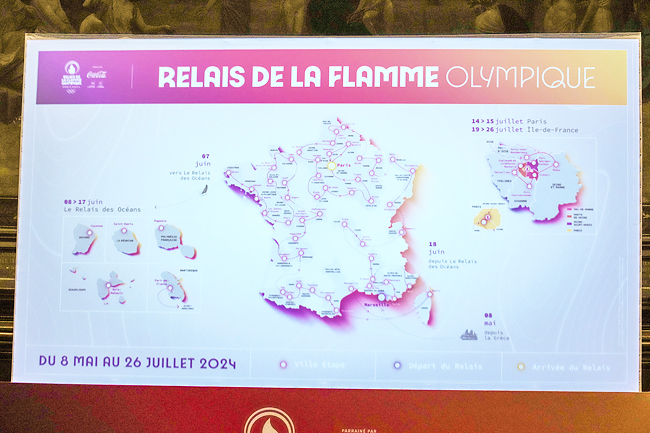PARIS (AP) – The Olympic flame for the 2024 Paris Games will pass through 64 departments – including five overseas – and 400 towns over 68 days before the cauldron is lit.
Organisers announced the route for the torch relay on Friday at a Paris university.
“Paris 2024 is the greatest collective project in our history,” organising committee President Tony Estanguet said. “The torch relay plays an important role because it has the capacity to touch so many people.”
The torch will be lit by the sun’s rays on April 16 in Ancient Olympia, Greece. It will then be carried around the nation before its handover in Athens.
The flame will leave Athens on April 27 aboard a three-mast ship named Belem for the French port of Marseille – a former Greek colony founded 2,600 years ago.

The Belem was first used in 1896, the same year the modern Olympics came back. It will be skippered by French navigator Armel Le Cléac’h, winner of the solo around-the-world race Vendée Globe in 2017. The crew will reach Marseille on May 8.
After leaving Marseille, the torch relay will take in heritage sites such the imposing Mont Saint-Michel in Normandy and the Carcassone. It will also trail along Saint-Émilion and Chablis.
“They are the Games of the country,” said Paris Mayor Anne Hidalgo, citing French author Victor Hugo and his theme of universality. “Paris belongs to the whole country.”
Including beyond its borders. A passage in France’s overseas territories, called the Relais des Oceans (Ocean Relay), will begin on June 9 in French Guiana and will take in the island of Reunion, Polynesia, Gaudeloupe and Martinique before coming back to Nice on June 18.
Continuing over land, the torch will rise up the Alpine mountain pass of Chamonix for Olympic Day on June 23 before spending July 14 – known as Bastille Day, France’s national day – and July 15 in Paris.
The torch will then tour various suburbs of Paris until returning via Seine-Saint-Denis – home to the Stade de France – before arriving back in Paris. “It’s an occasion to all come together, whatever our origins,” Hidalgo said.





